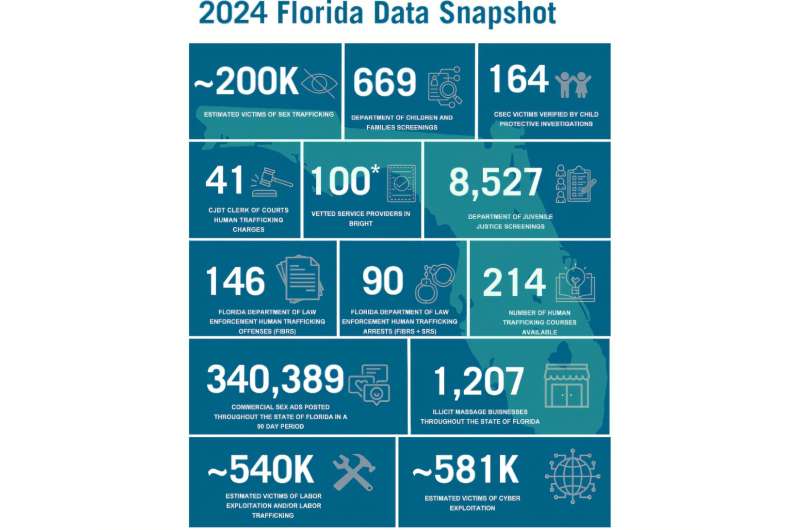
A recent report from the University of South Florida’s Trafficking in Persons (TIP) Lab estimates that more than 700,000 individuals were victims of human trafficking in Florida in 2024. The findings underscore the state’s heightened vulnerability to this crime, driven by its large population, significant tourism, and various major industries.
Commissioned by the state, “The 2024 State Report on Human Trafficking” outlines a comprehensive, data-driven strategy aimed at enhancing prevention, prosecution, and policy measures across Florida. The report highlights the increase in prosecutions and notes that penalties for trafficking in the state are higher than the national average.
Joan Reid, director of the TIP Lab, emphasized the importance of visibility in addressing human trafficking. “Human trafficking is considered a hidden crime, and its victims are often invisible,” she stated. “The key objective of this report is to make the hidden and invisible visible to those responsible for disrupting human trafficking in our communities.”
The report aggregates anonymous data from 30 agencies, nonprofit partners, and public surveys into its TIPSTR database. This data provides essential insights for Florida’s governor and legislative leaders, painting a clearer picture of the human trafficking landscape in the state.
Human trafficking flourishes in Florida due to several factors, including a large and diverse population, numerous major cities that host national and international events, and extensive transportation networks, such as airports and ports. Key industries, including agriculture, tourism, and entertainment, also contribute to the state’s susceptibility to trafficking.
In response to this pressing issue, prevention and criminalization efforts have intensified in recent years. A notable operation led to the arrest of 255 individuals involved in trafficking-related activities. Coordination among state agencies, nonprofits, and law enforcement is increasing, positioning Florida as a leader in human trafficking policy.
Florida State Senator Darryl Rouson, who sponsors the TIP Lab’s funding in the Senate Appropriations Committee, expressed optimism about the report’s impact. “We believe this annual report will have a substantial impact on anti-trafficking efforts, resulting in many adults and children being spared from the devastating consequences of human trafficking and many survivors receiving safe and effective assistance,” he said.
The report specifically examines Florida counties with populations exceeding 500,000, focusing on their performance and challenges in addressing human trafficking. Researchers evaluated each county’s risk, resilience, and response to trafficking on a scale from low to high, using data from sources such as the Florida Department of Children and Families and the Crisis Center of Tampa Bay.
Surveys conducted with 2,500 Floridians further helped discern the prevalence and geographical distribution of trafficking in the state. The TIP Lab, collaborating with various nonprofits, developed technology and data mapping tools to enhance their understanding of this critical issue. The lab utilized Lighthouse software created by Allies Against Slavery to aid in visualizing data related to human trafficking.
John Nehme, president and CEO of Allies Against Slavery, expressed his commitment to making victims visible. “We believe in a future where every community has the data it needs to make victims visible and prevent human trafficking,” he stated. “Data brings it into the light.”
A 2023 state law designated the TIP Lab as Florida’s repository for anonymous human trafficking data. This law mandates the collection and analysis of statewide data to better understand trends and the overall magnitude of criminal activity related to trafficking. The lab evaluates the effectiveness of state-funded initiatives aimed at combating trafficking and compiles annual reports for key state officials.
Reid noted the challenges faced in gathering comprehensive data in the past, stating, “A report like this had not been done before because it seemed impossible to gather all these strands of data located with so many different organizations.” She expressed gratitude for the state mandate that enabled the collection and analysis of such vital information.
The state report also incorporates data from the BRIGHT Network, an online platform operated by the TIP Lab that connects trafficking victims with local organizations and resources to assist them. This network facilitates coordination among anti-trafficking professionals, providing essential services such as healthcare and safe housing for survivors.
With the release of this report, Florida takes a significant step toward combating human trafficking and ensuring the safety and well-being of its residents.







